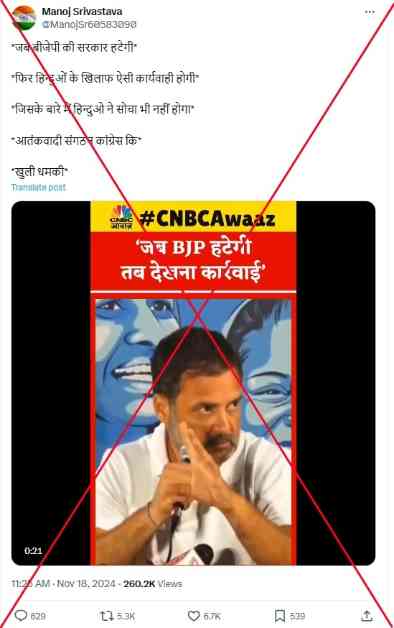In the lead-up to state assembly elections in India’s Maharashtra and Jharkhand states in November, a video of opposition leader Rahul Gandhi circulated on social media with false claims that he was threatening Hindu voters in the country. The video actually showed Gandhi criticizing government agencies under Prime Minister Narendra Modi’s Bharatiya Janata Party (BJP).
The false claims were spread through a Hindi-language post on November 18, 2024, that misrepresented Gandhi’s words in the video. The post was shared with an overlay of text that misquoted Gandhi as threatening action against Hindus once the BJP government is no longer in power.
However, a closer look at the video revealed that Gandhi was not issuing any threats to Hindus. Instead, he was highlighting the need for accountability and transparency in government institutions. He expressed concerns about the politicization of institutions such as the Election Commission, CBI, and ED, stating that they had become tools of the BJP and RSS.
The video in question was shared on Indian news outlet CNBC Awaaz’s official account in March 2024, with the caption indicating that Gandhi was addressing the issue of electoral bonds. The electoral bond scheme, implemented by the Indian government in 2018, allowed for anonymous donations to political parties by Indian citizens and corporate groups. This scheme came under scrutiny, with the Supreme Court of India declaring it unconstitutional in February 2024.
Gandhi’s remarks during the press conference in Maharashtra focused on the need for accountability and the restoration of democratic institutions. He emphasized that once the government changes, there should be action to ensure that such misuse of power does not happen again. This message was misconstrued in the false posts that circulated on social media.
The misinformation surrounding Gandhi’s video underscores the challenges of political communication in the digital age. False claims and misinterpretations can quickly spread online, leading to misunderstandings and misrepresentations of political leaders’ statements. It is essential for the public to critically evaluate information before forming opinions based on misleading content.
As India prepared for the state assembly elections, the focus should be on the policies and platforms of the political parties rather than on false narratives and divisive rhetoric. Ensuring transparency and accountability in the electoral process is crucial for upholding the principles of democracy and promoting informed decision-making among voters.
